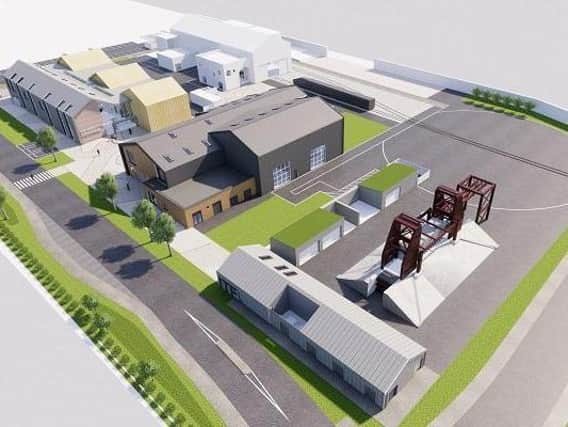Government urged to accelerate construction of University of Leeds developed high-speed rail Institute


The advanced rail Institute, located on a site next to Leeds Enterprise Zone and the proposed HS2 rolling-stock depot, will be one of the most advanced rail test and development centres in the world.
Building work on the University-developed site was paused at the start of the pandemic in March and whilst it is not known how long the delay will last, the rail industry wants the Institute to be operational in two to three years, which requires building work to resume in the next few months.
Advertisement
Hide AdAdvertisement
Hide AdThe Institute, on the south east edge of the city, is part of a broader initiative to create a UK centre of excellence for high-speed rail engineering in the Leeds City Region and will help the sector deliver on the taxpayer’s investment in rail which is expected to be in excess of £200 billion over twenty years.
The Institute is being developed by the University in partnership with West Yorkshire Combined Authority/Leeds City Region Enterprise Partnership, Leeds City Council, Research England and the rail industry.
Deputy Vice-Chancellor: Research and Innovation at the University of Leeds, Professor Nick Plant, said: “The University of Leeds has already invested £15 million in the Institute, which will help create a global hub for advanced rail technology and manufacturing in the Leeds City Region.
“The pandemic and the ongoing economic uncertainty have meant this important project is in threat of being delayed.
Advertisement
Hide AdAdvertisement
Hide Ad“With the government’s help, we can get the Institute back on track, support the creation of highly skilled jobs and pave the way for the UK to become a major exporter in fully-tested railway technology.”
To enable building work to recommence, the University is asking the Government to underwrite the Institute’s capital costs to allow the test facilities to be operational in time to support the rail industry with its major infrastructure projects.
The research facilities are designed to identify and eliminate any problems that have affected other large rail infrastructure schemes where new technologies fail to integrate causing unexpected faults and breakdowns.
Sir Peter Hendy, the chair of Network Rail, said: “The Institute represents a game changing opportunity for the UK in both conventional and high-speed rail research and innovation.
Advertisement
Hide AdAdvertisement
Hide Ad“It will provide the UK with a whole system approach to railway testing, development, validation and certification, facilitated through closer industry collaboration.
“At Network Rail we are planning to utilise the facility to mitigate the delivery risks to some of our projects such as the Transpennine and East Coast Upgrades.
“The plans for the Institute have been aligned with Leeds City Region’s industrial strategy.
“It will enable growth in future businesses, in rail technology and products, facilitating higher skills development and supporting the creation of more productive jobs in the north and across the UK.”
Advertisement
Hide AdAdvertisement
Hide AdAlong with many other universities, the University of Leeds paused its capital spending at the start of the first national lockdown.
Councillor Judith Blake, Leader of Leeds City Council, said: “The Institute for High-Speed Rail and System Integration is not only a game-changer for the UK but also at a local and regional level, because of the many skilled jobs and opportunities it will create and the major economic benefits it will bring.
“Such a world-leading institute will provide the catalyst to attract major companies within the rail industry supply chain to establish themselves in the Leeds City Region, particularly considering it will be built alongside the proposed HS2 rolling stock depot.
“We are proud to support the Institute and its campaign to secure investment, accelerating its construction and bringing the economic benefits sooner rather than later.”
Advertisement
Hide AdAdvertisement
Hide AdRoger Marsh OBE DL, Chair of the Leeds City Region Enterprise Partnership and NP11, said: “The Institute for High-Speed Rail and System Integration is the centrepiece of a plan to develop a national centre for rail engineering in the Leeds City Region.
"It will attract companies in the rail sector to invest and create high-quality jobs.
"There is a pressing need for the Institute to be operational in time to help with the big investment that is taking place in rail, to ensure taxpayers get value for money, that the economic benefits that come with that investment are seen in the Leeds City Region, and that we have a rail network that is fit for the 21st century."
The West Coast Partnership won the franchise to run rail services between London, the North West and Scotland and will be involved in the design and development of phase one of HS2, the high-speed line between London and the West Midlands.
Advertisement
Hide AdAdvertisement
Hide AdManaging Director of The West Coast Partnership, Caroline Donaldson, said she wanted the Institute involved in the testing and commissioning of new technologies, particularly those linked to HS2.
She said: “As we have seen in major rail infrastructure projects in the UK and abroad, the importance of rigorous systems integration testing and early design verification and validation cannot be understated.
“They are critical to timely delivery of programme benefits and mitigation of risks.”
Comment Guidelines
National World encourages reader discussion on our stories. User feedback, insights and back-and-forth exchanges add a rich layer of context to reporting. Please review our Community Guidelines before commenting.